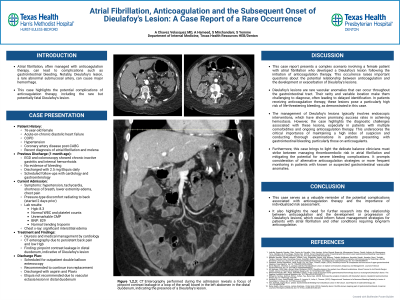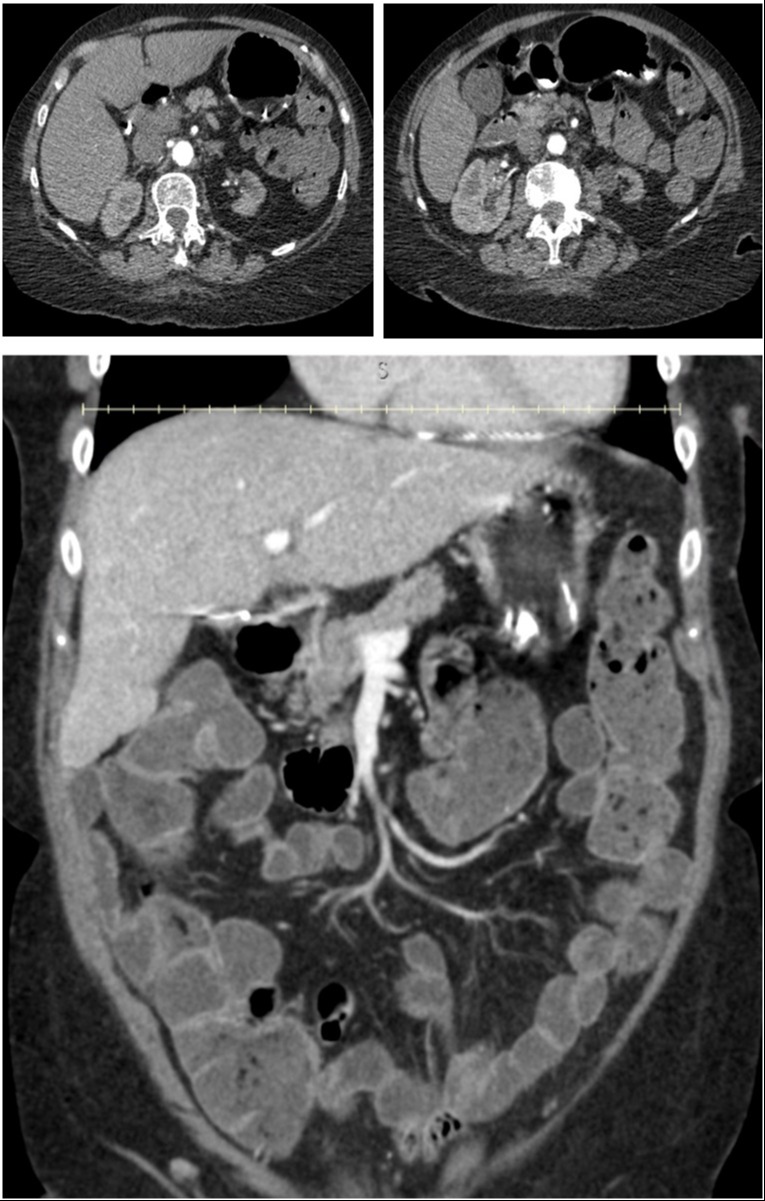Monday Poster Session
Category: GI Bleeding
P2485 - Atrial Fibrillation, Anticoagulation and the Subsequent Onset of Dieulafoy's Lesion: A Case Report of a Rare Occurrence
Monday, October 28, 2024
10:30 AM - 4:00 PM ET
Location: Exhibit Hall E

Has Audio

Azfar Hameed, MD
Texas Health Resources
Colleyville, TX
Presenting Author(s)
Ana Chavez Velasquez, MD1, Azfar Hameed, MD2, Sonakshi Mirchandani, MD3, Soumya Yemme, MD3
1Texas Health Resources, Lewisville, TX; 2Texas Health Resources, Colleyville, TX; 3Texas Health Resources, Bedford, TX
Introduction: Atrial fibrillation, often managed with anticoagulation therapy, can lead to complications such as gastrointestinal bleeding. Notably, Dieulafoy's lesion, a rare abnormal submucosal artery, can cause major hemorrhage. This case highlights the potential complications of anticoagulation therapy, including the rare but potentially fatal Dieulafoy's lesion
Case Description/Methods: A 76-year-old female patient with a history of acute-on-chronic diastolic heart failure, COPD, hypertension, and coronary artery disease post-CABG. Patient was recently discharged a month ago following a new diagnosis of atrial fibrillation and melena after a stress test. An EGD and colonoscopy evaluation showed chronic inactive gastritis and internal hemorrhoids with no evidence of bleeding. She was discharged with a daily dose of 2.5 mg of Eliquis and scheduled follow-up appointments with cardiology and gastroenterology.
During this admission, she exhibited hypertension and tachycardia, progressive shortness of breath, lower extremity edema, and chest pain. She also reported pressure-type discomfort that radiated to the back, starting two days prior. Her CBC showed a Hgb of 8.3, while WBC and platelet counts were normal. Her CMP was unremarkable, and a BNP of 829 and a normal trending troponin were noted. A chest x-ray revealed significant interstitial edema. After appropriate diuresis and medical management guided by the cardiology department, the patient was prepared for discharge. However, due to persistent back pain and a Hgb around 8, a CT enterography was ordered. The post-contrast images revealed a pinpoint contrast leakage in a loop of the small bowel in the left abdomen in the distal duodenum, indicative of a Dieulafoy’s lesion.
The patient is scheduled for a double balloon enteroscopy as an outpatient and is recommended to continue iron replacement. Following discussions with gastroenterology and cardiology, she was discharged with aspirin and Plavix. Given the risks and findings of a vascular ectasia lesion in the distal duodenum, Eliquis was not recommended.
Discussion: Anticoagulation therapy, while crucial for managing conditions such as atrial fibrillation, can cause complications, including the development of a Dieulafoy's lesion. Clinicians treating patients with atrial fibrillation who are on anticoagulation therapy should consider this potential complication when diagnosing unexplained gastrointestinal bleeding. Early detection and proper endoscopic management can lead to successful treatment outcomes

Disclosures:
Ana Chavez Velasquez, MD1, Azfar Hameed, MD2, Sonakshi Mirchandani, MD3, Soumya Yemme, MD3. P2485 - Atrial Fibrillation, Anticoagulation and the Subsequent Onset of Dieulafoy's Lesion: A Case Report of a Rare Occurrence, ACG 2024 Annual Scientific Meeting Abstracts. Philadelphia, PA: American College of Gastroenterology.
1Texas Health Resources, Lewisville, TX; 2Texas Health Resources, Colleyville, TX; 3Texas Health Resources, Bedford, TX
Introduction: Atrial fibrillation, often managed with anticoagulation therapy, can lead to complications such as gastrointestinal bleeding. Notably, Dieulafoy's lesion, a rare abnormal submucosal artery, can cause major hemorrhage. This case highlights the potential complications of anticoagulation therapy, including the rare but potentially fatal Dieulafoy's lesion
Case Description/Methods: A 76-year-old female patient with a history of acute-on-chronic diastolic heart failure, COPD, hypertension, and coronary artery disease post-CABG. Patient was recently discharged a month ago following a new diagnosis of atrial fibrillation and melena after a stress test. An EGD and colonoscopy evaluation showed chronic inactive gastritis and internal hemorrhoids with no evidence of bleeding. She was discharged with a daily dose of 2.5 mg of Eliquis and scheduled follow-up appointments with cardiology and gastroenterology.
During this admission, she exhibited hypertension and tachycardia, progressive shortness of breath, lower extremity edema, and chest pain. She also reported pressure-type discomfort that radiated to the back, starting two days prior. Her CBC showed a Hgb of 8.3, while WBC and platelet counts were normal. Her CMP was unremarkable, and a BNP of 829 and a normal trending troponin were noted. A chest x-ray revealed significant interstitial edema. After appropriate diuresis and medical management guided by the cardiology department, the patient was prepared for discharge. However, due to persistent back pain and a Hgb around 8, a CT enterography was ordered. The post-contrast images revealed a pinpoint contrast leakage in a loop of the small bowel in the left abdomen in the distal duodenum, indicative of a Dieulafoy’s lesion.
The patient is scheduled for a double balloon enteroscopy as an outpatient and is recommended to continue iron replacement. Following discussions with gastroenterology and cardiology, she was discharged with aspirin and Plavix. Given the risks and findings of a vascular ectasia lesion in the distal duodenum, Eliquis was not recommended.
Discussion: Anticoagulation therapy, while crucial for managing conditions such as atrial fibrillation, can cause complications, including the development of a Dieulafoy's lesion. Clinicians treating patients with atrial fibrillation who are on anticoagulation therapy should consider this potential complication when diagnosing unexplained gastrointestinal bleeding. Early detection and proper endoscopic management can lead to successful treatment outcomes

Figure: Figure 1: CT Enterography performed during the admission reveals a focus of pinpoint contrast leakage in a loop of the small bowel in the left abdomen in the distal duodenum, indicating the presence of a Dieulafoy's lesion.
Disclosures:
Ana Chavez Velasquez indicated no relevant financial relationships.
Azfar Hameed indicated no relevant financial relationships.
Sonakshi Mirchandani indicated no relevant financial relationships.
Soumya Yemme indicated no relevant financial relationships.
Ana Chavez Velasquez, MD1, Azfar Hameed, MD2, Sonakshi Mirchandani, MD3, Soumya Yemme, MD3. P2485 - Atrial Fibrillation, Anticoagulation and the Subsequent Onset of Dieulafoy's Lesion: A Case Report of a Rare Occurrence, ACG 2024 Annual Scientific Meeting Abstracts. Philadelphia, PA: American College of Gastroenterology.
